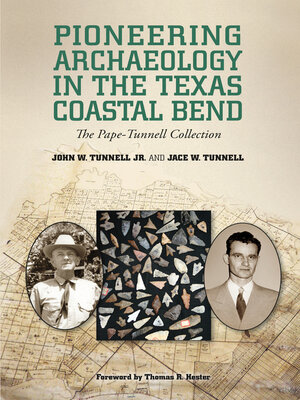Pioneering Archaeology in the Texas Coastal Bend
ebook ∣ The Pape-Tunnell Collection · Gulf Coast Books, sponsored by Texas A&M University-Corpus Christi
By John W. Tunnell

Sign up to save your library
With an OverDrive account, you can save your favorite libraries for at-a-glance information about availability. Find out more about OverDrive accounts.
Find this title in Libby, the library reading app by OverDrive.



Search for a digital library with this title
Title found at these libraries:
| Library Name | Distance |
|---|---|
| Loading... |
When Harold F. Pape moved to Gregory, Texas, in 1927, he quickly became fascinated by the wealth of Native American artifacts along the nearby shoreline of Corpus Christi Bay and what is now called Port Bay, a southern arm of the larger Copano Bay.
A lifelong natural history enthusiast and collector, Pape met and married Lucile H. Tunnell, a widow with three young sons. Before long, John W. Tunnell, Lucile's oldest son, was accompanying Pape on his field studies in surrounding areas and the wider Texas Coastal Bend.
Working in the days before much of the development that now covers the region, Pape and Tunnell studied more than two hundred sites throughout the Coastal Bend, making meticulous logs, maps, and notes of their discoveries.
John W. (Wes) Tunnell Jr. and Jace Tunnell have organized and documented their family collection and present it, along with brief biographies of the two collectors, as a survey of the state of knowledge in the late 1920s and 1930s, as well as a tribute to these two important early researchers and their body of work.
A lifelong natural history enthusiast and collector, Pape met and married Lucile H. Tunnell, a widow with three young sons. Before long, John W. Tunnell, Lucile's oldest son, was accompanying Pape on his field studies in surrounding areas and the wider Texas Coastal Bend.
Working in the days before much of the development that now covers the region, Pape and Tunnell studied more than two hundred sites throughout the Coastal Bend, making meticulous logs, maps, and notes of their discoveries.
John W. (Wes) Tunnell Jr. and Jace Tunnell have organized and documented their family collection and present it, along with brief biographies of the two collectors, as a survey of the state of knowledge in the late 1920s and 1930s, as well as a tribute to these two important early researchers and their body of work.







